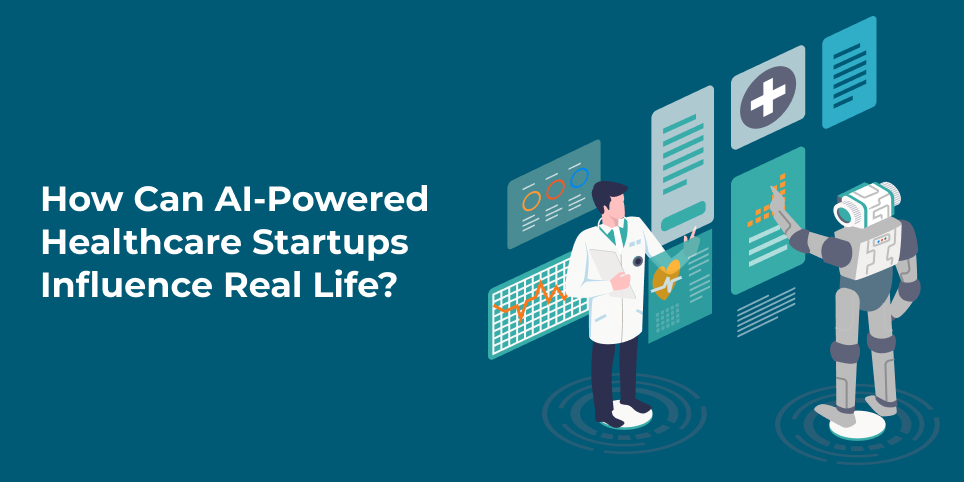
How can AI-powered Healthcare Startups influence real life?
Table of Contents
- What Does AI Mean of Healthcare?
- The AI Healthcare Scenario 2022
- What Kinds of AI are Used in Healthcare?
- Artificial neural networks and deep learning are the two main types of ML.
- Innovations of AI in Healthcare
- Benefits of AI in Healthcare
- Challenges in AI Healthcare
- Future of AI in Healthcare
- FAQs
The possibilities are endless if artificial intelligence is used to frame healthcare industry intelligence. AI in the healthcare industry has been establishing standards for growth. As employing AI has increased corporate efficiency by 54%, 91.5% of high-scale organizations are investing in it. When we talk about healthcare businesses, AI companies have flourished.
Many healthcare companies still need to learn about the fantastic things artificial intelligence can achieve for their business. Here we will discuss the state of AI in healthcare today including the changes it has brought, its advantages, the difficulties in applying AI to healthcare, and other important information.
What Does AI Mean for Healthcare?
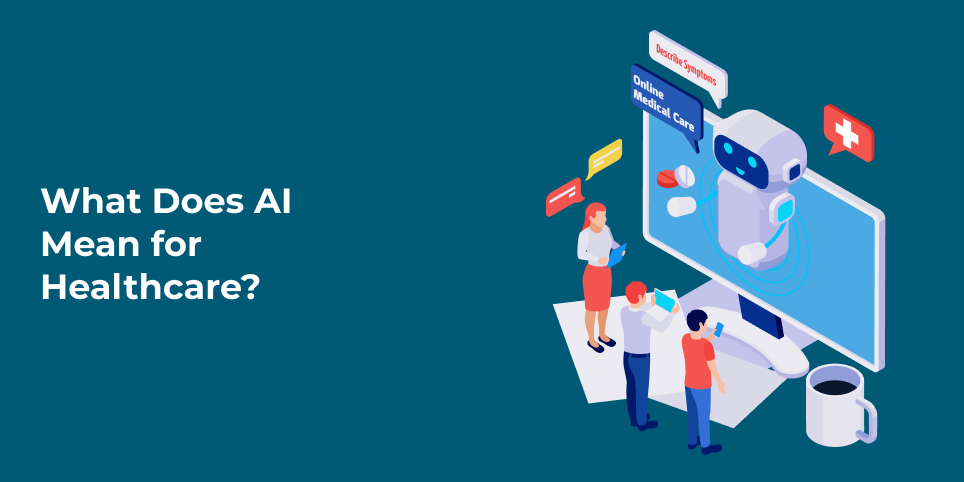
The use of AI in healthcare is still very new. After deploying AI technologies, some healthcare startups have claimed to have noticed significant changes. Assistance is required in learning everything from scratch because all AI healthcare firms use artificial intelligence for their next big action plan.
AI is called “ML in healthcare,” an acronym for machine learning algorithms and other cognitive technologies. Artificial intelligence or AI is the capability of computers and other technologies to mimic human cognition and to learn, think, decide, and act. Therefore, AI in healthcare refers to using computers to analyze and take action on medical data, frequently intending to foresee the outcome.
The AI Healthcare Scenario 2022
Let’s look at some statistics describing the state of AI in the healthcare industry right now:
- The market is expected to swell at a compound annual growth rate (CAGR) of 46.1% to reach USD 95.65 billion by 2028 from USD 6.60 billion in 2021.
- The pharmaceutical and biotechnology startups area is anticipated to expand at a rapid CAGR between 2022 and 2028.
- The worldwide AI digital health market by key segment for specific years between 2015 and 2025, according to Statista’s analysis. By 2025, it’s anticipated to be close to 190 billion dollars.
- Given the revolution AI has brought about in the healthcare sector, it is anticipated that by 2026, AI applications will have reduced US healthcare spending by $150 billion annually.
- Healthcare AI applications are anticipated to advance between 2022 and 2028.
The pharmaceutical & biotechnology Startups
Natural language processing
The clinical trials participant identifier
These significant figures, therefore, summarised the booming time of artificial intelligence-driven healthcare startups.
What Kinds of AI are Used in Healthcare?
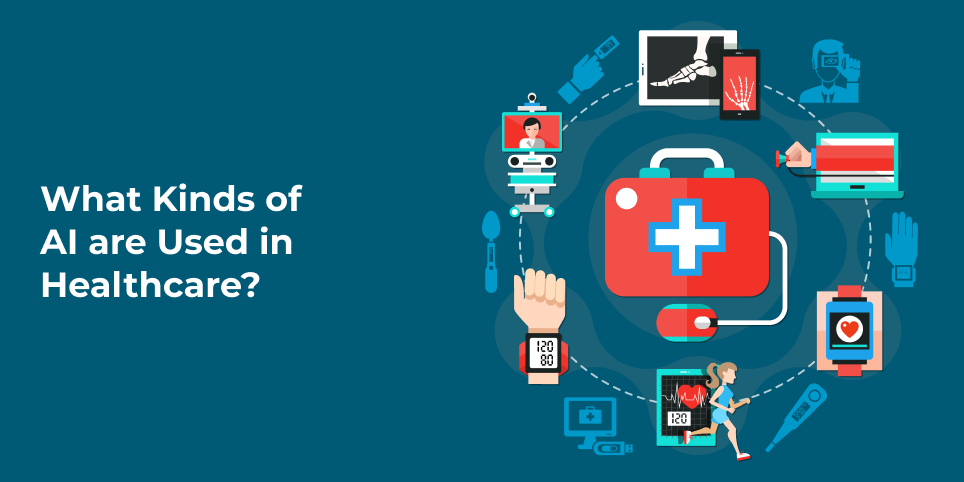
1. Natural Language Processing (NLP)
Since it has been decades since AI first appeared, its researchers have been working to understand human language precisely. Natural language processing, or NLP, is helpful for various tasks, including text translation, analysis, and speech recognition. Two methods are used for the process: statistical NLP and semantic NLP. However, it is frequently employed because statistical NLP is based on deep learning neural networks and machine learning, which are pretty accurate at text recognition and language recognition.
The creation, interpretation, and classification of texts are some of the fundamental NLP functions that help to make the most of these insights. NLP also functions as a tool for analysis of unstructured patient data. It automatically generates information regarding patient diagnoses and records their communications to conduct conversational AI.
2. Robotics Process Automation
In reality, robotic process automation has little to do with robots. Instead, they are server-based computer applications that employ automation technologies and can learn, simulate, and display rule-based business processes. RPA is relatively tiny compared to other artificial intelligence systems. It is also simple to program and monitor because it lacks a straightforward user interface.
Startups in the healthcare industry can use AI for routine operations like prior permission, billing, and updating patient information and records. In addition, the same technology can be combined with other technologies, such as image recognition, extract data from, say, faxed photographs and feed it into transactional systems.
3. Machine Learning
Here, we’re discussing machine learning, one of the most popular and widely applied types of artificial intelligence. ML is nothing more than a statistical approach that optimizes model fit to data to extract valuable insights from the data. But first, you must know if we are explicitly discussing machine learning in healthcare. Healthcare startups benefit most from machine learning’s accuracy in diagnosing illnesses, prescribing medications, and planning medical procedures based on a patient’s characteristics and medical history. But to get the desired results, machine learning and its use in precision medicine need training datasets; this method is known as supervised learning.
Artificial neural networks and deep learning are the two main types of ML.
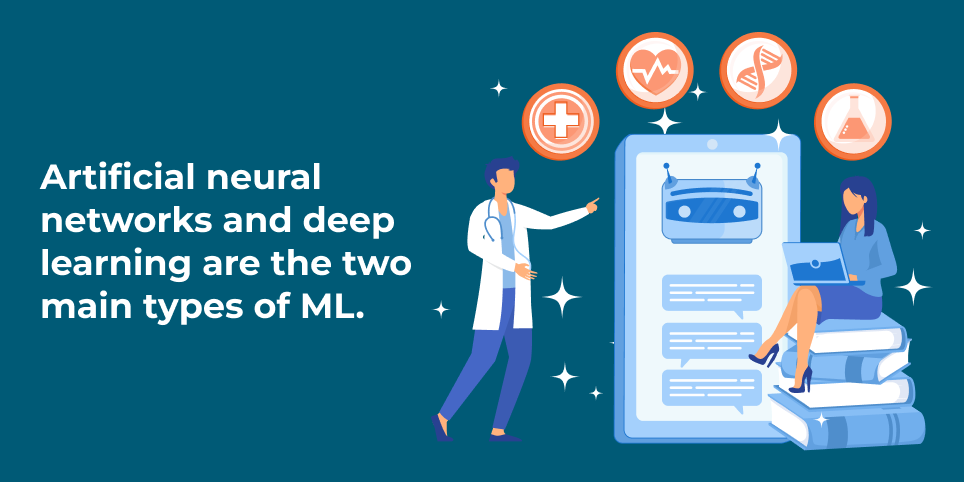
Let’s start with a comprehensive and sophisticated type of machine learning that has been around for a while: artificial neural networks. Artificial neural networks, or ANNs, use a collection of algorithms to replicate the human brain. Four elements typically comprise a neural network: inputs, weights, a bias or threshold, and an output.
Deep learning is one of the most significant and complex types of machine learning. Deep learning is merely a part of machine learning, though. Their methods for employing algorithms on the data and learning from it significantly distinguish them. More of the feature extraction portion of the process is controlled by deep learning, reducing the need for manual human intervention. Large data sets may be used with it, which is why it has earned the moniker “scalable machine learning.”
1. Physical Robots
You might be astonished to learn that over 200,000 industrial robots are placed worldwide annually. As their name implies, industrial robots are designed to carry out certain activities, such as repositioning, lifting, welding, assembling products, and so forth. Robots have become more proficient at pacing as the years go by. They are constructed and designed so that training them to move or transition to another duty does not require much work.
Speaking of physical robots in healthcare AI, we have observed robots performing their duties effectively. They work together with people in a humane manner. It’s all a result of AI’s powers.
2. Rule-based Expert System
In AI, expert systems have been around for decades. Since a few decades ago, they have primarily been used in “clinical decision support” applications in AI healthcare, with healthcare entrepreneurs currently making the best use of them. Numerous electronic health record (EHR) providers today include a set of regulations with their systems.
These expert systems need the assistance of human specialists to incorporate a set of regulations of a specific knowledge domain. When there are many rules, the task gets more difficult since the rules often clash and finally fall out of harmony.
The Innovations of AI in Healthcare
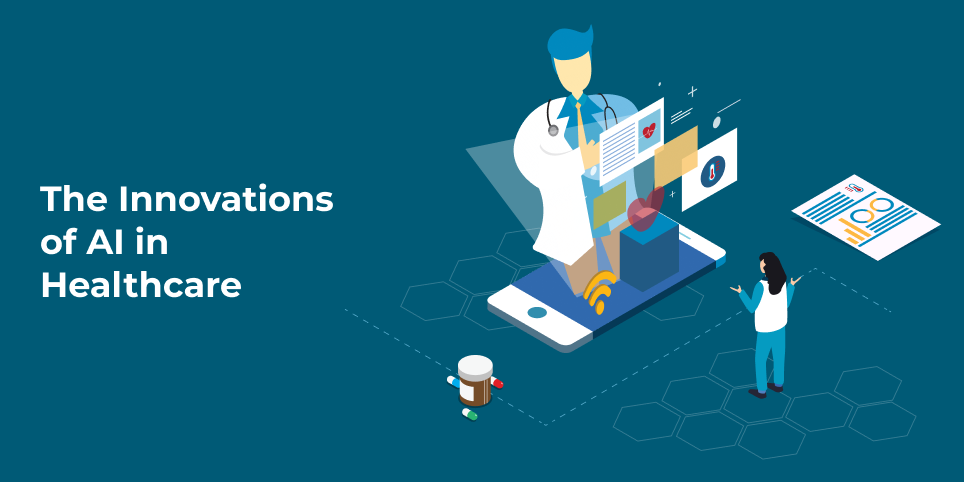
We have discussed how companies use AI to achieve their goals and how it delivers excellence and transformation to the healthcare sector. Now let’s discuss the main advancements that AI in healthcare has made:
● The evolution of diagnosis and drug development with AI
The COVID-19 era has left an enduring legacy of artificial intelligence. The discovery of new drugs and the effectiveness of the diagnostic process have benefited most from machine learning if we are talking about what AI has accomplished in healthcare startups beyond information processing and decision-making. In particular, for people who have already received treatment for the symptoms of COVID-19, AI has aided in using CT scans to identify any pneumonia symptoms.
● The application of AI to mental health
When it comes to using AI in healthcare, it’s not just about physical health; mental health has significantly benefited from the technology. Machine learning algorithms have been made available by Harvard University academics to monitor traits and symptoms related to mental health. As the prevalence of mental illness has increased daily, AI models can now assess material on suicidality, sadness, and devastation. AI can also identify chemical alterations in the human brain that indicate a particular mental disorder. The most prevalent disease among all the symptoms is dementia.
There are numerous types of dementia recognized by medical research, with Alzheimer’s being the most prevalent. Our memory and communication are primarily affected by Alzheimer’s disease. Examining the soundness of human speech has become possible thanks to deep learning and AI for audio processing. AI systems are trained to distinguish between a healthy speaker, a speech, and one exhibiting dementia signs.
● Data storage and cloud hosting
We already know that cloud hosting and computing services are far more secure than conventional services. Regarding functionality and coherence, HIPAA-compliant cloud hosting is a good choice for any healthcare company that needs electronic health records (EVR). We should open our discussion of cloud hosting and data storage to more than just teleconferencing and hosting data. The security, appointment administration, secure messaging, location services, visit history, wearable integration, and other aspects of cloud hosting are also extremely good. These are some additional standout characteristics of the cloud.
There are healthcare AI technologies like Google Health and cloud hosting services. This AI healthcare tool aims to improve everyone’s quality of life by providing goods and services that connect and contextualize health data. It creates technology solutions to help care teams provide better connected care. Additionally, Google Health is investigating the application of artificial intelligence to help with cancer diagnosis, blindness prevention, and much more.
● Augmented Reality and Mixed Reality in Healthcare
In AI healthcare businesses, augmented reality and mixed reality are pushing the envelope of traditional medical procedures. Especially if you watch, surgeons use mixed reality headsets like the Microsoft Hololens 2. These headsets can provide the surgeon with heads-up information while allowing them to operate both hands-free.
These operations can not only affect the head-up information but can also be quite helpful for training purposes. Doctors can quote their inputs thanks to a head-mounted camera view. The use of augmented reality is more comprehensive than headgear and operating rooms. Nurses can locate veins to collect blood by using the technology as well.
● AI Wearables
Up until now, wearables have been AI’s most well-liked technologies. Its feature, which allows the user to track the patient’s condition throughout the day remotely, is a prime example of innovation. However, the luxury of being able to monitor your heart rate has to be considered when determining the wearables revolution in healthcare. Wearables may monitor many additional elements, such as physical health via pedometers and blood oxygen saturation, yet there are others for which they are appreciated. However, it might be easier to detect low blood oxygen saturation with specialized equipment. Smartwatches with this sensor can save lives because this condition can occur during pregnancy.
● Smart pills
“smart pills” refers to tiny electronic devices, sometimes shaped like pharmaceutical capsules, used to conduct complex tasks like sensing, imaging, and drug delivery. They could be pH, chemical, or biosensors, as well as images or biosensors.
These tiny pills explore your GI tract while gathering pressure, PH, and temperature information. After the capsule is consumed, the information gathered by the capsule is collected by a fastened data receiver to a belt.
● Transport and evaluation of organs
Speaking about organ evaluation, Transmedics’ invention, the organ care system provides ongoing assistance. The vital body organs like the heart, lungs, and liver can be retained outside the body for a few hours with this organ care system. As a result, they receive proper medical attention, essential nourishment, and care. According to specialists, however, this technology will have a bright future in artificial intelligence since it can operate independently, without a doctor’s intervention, and preserve the organ for extended periods.
● Bioprinting: New organ creation
The idea of creating new organs is enormous; therefore, this is astonishing. Even so, 3D-printed organs are somewhat realistic in appearance. Even though it is still developing, the technology has already entered clinical testing. Body parts tested in clinical settings for 3D bioprinting include bones, skin, ears, and corneas.
In any case, 3D bioprinting and the process of creating new organs are very similar. Making a computerized model of the tissue is the first step. This procedure calls for a hawk-eye to monitor the matrix structure and resolution; thus, it is pretty precise. It’s because bio-ink, made of live cells, is employed as the primary component in the printing process. The organ must then be stimulated to be tested for functionality.
● Cancer Diagnosis
Years have passed since biopsy was thought to be the only accurate method of a cancer diagnosis. The biopsy is the procedure used to remove tissue to diagnose the illness. However, as AI in healthcare has developed, the most sophisticated histopathology techniques now rely on digital scans of the specific region that cell mutations can impact. Pathologists may now investigate far more significant sections of human beings at once thanks to the use of whole slide images, or WSI.
Even though the WSN scans are comprehensive and insightful, the process is still laborious and painful. You must go through every aspect before the inspection can assist you with the outcome. However, this is no longer a concern because convolutional neural networks and computer vision may be used to handle AI applications. In addition, this method highlights the area of interest where probable cancer cells may be located, which helps shorten the time for diagnostics and eases the burden on medical workers.
● Medicine or Drug Discovery
Clinical trials are still the standard way of developing medications, but they are expensive and take longer. Creating pharmaceuticals had sped up and become relatively inexpensive when AI drug production was introduced to the healthcare sector. Small-molecule drug development can benefit from artificial intelligence in four straightforward ways: access to new biology, improved or original chemistry, higher success rates, and speedier and less expensive discovery procedures. In addition, this technique can solve several problems and restrictions in conventional research and development.
Benefits of AI in Healthcare
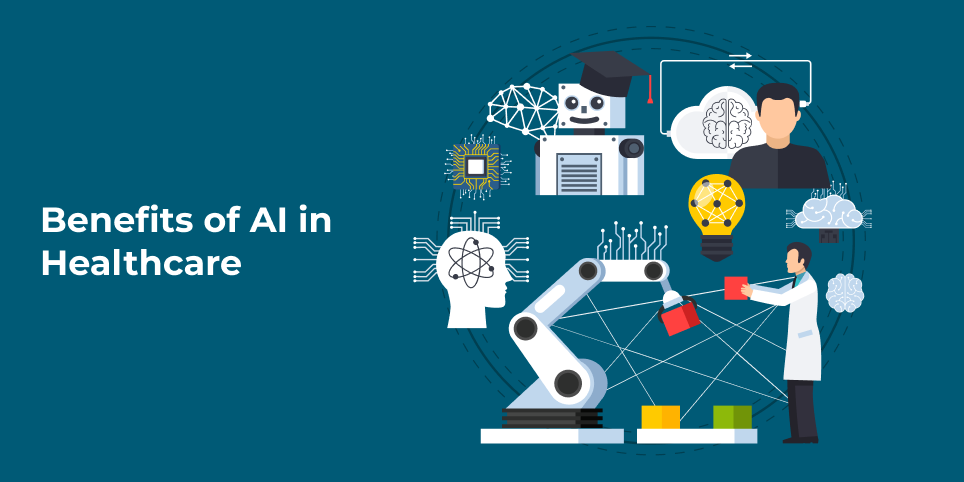
We are confident that you are already in awe after learning about the incredible advancements made by AI in the healthcare sector. Let’s examine the effects and advantages that the notion of AI has brought to the healthcare sector:
● Rapid Diagnosis
Healthcare providers may now provide brief diagnoses thanks to AI-driven platforms like Google Health and InformAI, based on information about the patient’s current and past health conditions. With this method, healthcare startups have encountered several symptoms and have received the appropriate diagnoses. As a result, healthcare experts can draw logical conclusions quickly and prepare a strategy for potential hazards in the future, along with workable methods to deal with them.
● Assistance in surgery
Thankfully, AI has taken off in robotic applications and has been a big success. For example, AI surgical systems are now accessible to assist with every movement, and they do so with the utmost precision, thanks to the advent of AI in healthcare, which means that skilled medical personnel may now carry out complex procedures with almost no risk of adverse effects, blood loss, or pain. As a result, the patient’s chances of quick recovery rise.
● Advanced Accessibility
Thanks to artificial intelligence, advancements have been made, particularly in healthcare. The globe has seen AI dominate the healthcare sector after seeing the advances AI has brought. Digital tools powered by AI aid patients in diagnosis and therapy. Applications have been developed that are noteworthy for allowing national and international healthcare institutions to collaborate and effectively help those in need.
Challenges in AI Healthcare
The third section on AI in healthcare will now discuss the difficulties that the healthcare sector, particularly AI healthcare startups, has faced:
● Updating Regulations
We all follow the law, but when it comes to legal matters, countless confidentiality and privacy rules apply to medical data worldwide. With such strong protection, healthcare firms can recognize that sharing data among AI systems is illegal. Patients must give their agreement when it is legal to obtain their medical information and use it for medical needs. Here, if adaptability plays a role, the difficulty can be overcome. Medical data-gathering regulations need to be flexible while protecting healthcare companies’ identities. Conditions should be put in place, and medical institutions must also verify strict adherence to these regulations and be in charge of collecting and using patient data. The benefits of flexibility and upholding the law can then be appropriately balanced.
● Human disagreement
Disagreements and differences of opinion are inevitable whenever new technology, like artificial intelligence, is introduced to the realm of technology. Many patients and medical experts are hesitant about artificial intelligence occupying a significant portion of the healthcare sector. Many radiologists do not want robots to replace them in the medical field. Many people there refuse to give themselves to machines and are afraid to have their medical problems handled.
● Chances that AI will encounter a roadblock
Machines are human-like in that they occasionally make mistakes. Well, sometimes even machines make mistakes. For instance, if an AI-based system misdiagnoses a patient’s condition, prescribes the wrong medication, or fails to detect a tumor during a radiological scan, the patient may suffer severe harm, suffer serious health effects, or even pass away.
Future of AI in Healthcare
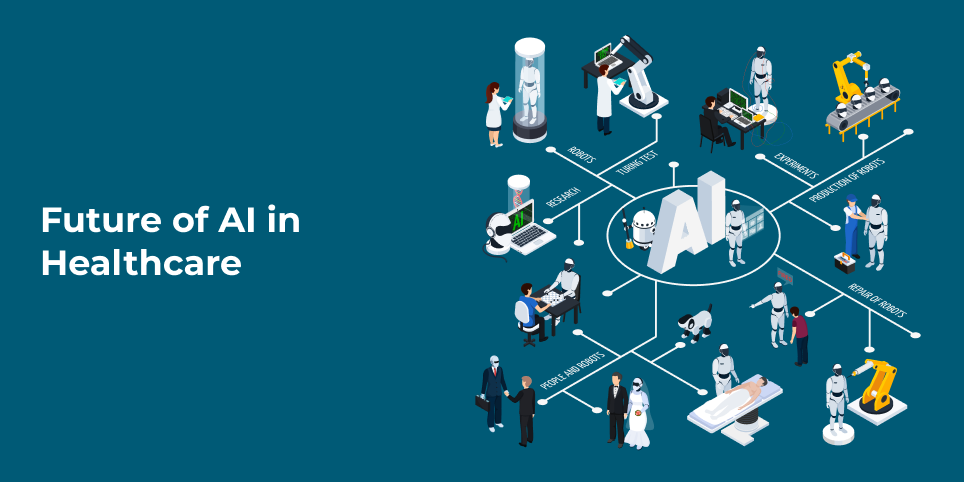
Speaking of the panorama of artificial intelligence in the healthcare sector, it has given the industry the advance it requires. Drug creation has a more promising future with artificial intelligence in healthcare than other applications. Artificial intelligence in healthcare can create and produce cutting-edge medications to treat various life-threatening conditions. This potential has been rapidly expanding. However, the drug development sector needs additional resources and time to create and raise new pharmaceuticals for the market. It requires enogh time and money to conduct research, develop products, conduct clinical studies, and get patents approved. Clinical trials for new drugs can cost billions of dollars.
Pharmaceutical businesses have been implementing AI technology to improve medicine efficiency and lower development costs. The roles of artificial intelligence in healthcare are innumerable. They range from robotic surgery and telemedicine services to digitizing medical discussions, computerized record management, and virtual access to patient’s health status. AI has been leading the way in expediting digital workflows throughout the healthcare industry.
How can I Support Your AI Project?
The idea of artificial intelligence in the healthcare sector has raised the bar for that sector. You may see the value of the breakthroughs we’ve listed for the top uses of AI in the healthcare sector, particularly regarding healthcare startups. Furthermore, we anticipate that you thoroughly understand AI at this point.
As a leader, I suggest my team to actively work to advance and distinguish ourselves from other businesses. We have been actively developing superior AI and ML models specifically created to increase revenue, lower costs, and provide a positive customer experience.
FAQs
Which AI feature is most beneficial to the healthcare industry?
Assistants in virtual healthcare, It’s one of the most comprehensive and individualized AI concepts.
AI in healthcare: Is it secure?
Overall, findings show that AI in healthcare is reliable. After conducting countless polls and studies, researchers discovered that people had a favorable attitude toward AI in healthcare. According to the survey, 56% of respondents think AI will improve healthcare in the next five years, while only 6% feel the opposite.
How is AI applied in medicine?
Artificial intelligence is primarily used in the healthcare sector in five ways: medical image analysis, applications for diagnosis and treatment, patient data, remote patient help, and medication development. AI is the future, and it is the only way to go forward.



